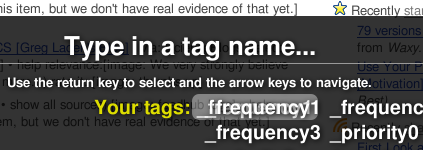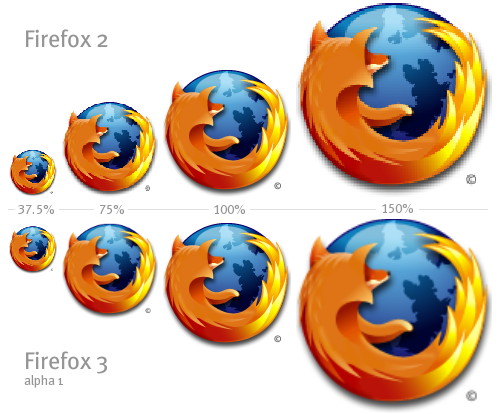I felt that these didn’t get specific enough, so here are some custom messages for users of other browsers.



I felt that these didn’t get specific enough, so here are some custom messages for users of other browsers.



Featuring a new icon (among other things).

Does anybody else get these? When you navigate to your labels or subscriptions using keyboard shortcuts, the highlighted item in this modal window thing has a text “shadow” or duplicate sitting ten pixels over to the left. It’s been bothering me for a while now and I can’t find anybody else talking about it. I guess I’m supposed to file a bug?
Firefox 3 is scheduled to be released later this fall; I haven’t really been following its development, but one thing I have heard about and am excited about is its (or, more accurately, Gecko‘s) new graphics library, Cairo.

First I heard that it would resample rather than simply rescale images, as demonstrated in the image above (via Acts of Volition).
Later I learned that it will also render fonts more smoothly. I enjoy the soft way pages look in Safari for Windows, the result of a different rendering engine, WebKit, so this is something I’m really looking forward to. Here’s an example of Cairo’s font rendering, as seen in Camino 1.2+ for Mac, via hicksdesign:

There are very specific reasons for the intentional differences in these approaches to font rendering. It’s a matter of personal preference, and I think my preference will be for Cairo. Some are floored by the superiority of WebKit, and designer Jeffrey Zeldman makes a solid, objective case for it; others are horrified.
Finally, Gecko’s non-standard CSS attribute -moz-border-radius, a precursor to CSS3‘s border-radius attribute, will make image-less rounded div corners easy and pretty (via Acts of Volition):

I would have posted screenshots of my own, but I don’t trust these alpha builds not to eff things up.
I love Mozilla Thunderbird, not least of all because it’s a Mozilla-branded product, but also largely because of its adaptive junk mail filter. What this means is that for every email you get, you’re able to mark it as “junk” or as “not junk,” and from both of these practices, Thunderbird begins to learn (through Bayesian filtering) how to identify spam.
If you’re anything like me you’ve noticed that spammers are getting a lot craftier in recent months; I’ve even had a few spam emails slip into my Gmail inbox, when Gmail has in my experience been nothing short of astounding in its ability to identify spam. Which is to say, Thunderbird isn’t catching everything for me, at least not yet. I mark every spam I get as such, but the filtering relies on your marking the non-spam as well.
Anyway, it’s not hard work to mark all these emails (especially if you can highlight a bunch from a number of trusted senders and mark “not spam”), but it’s still work, and I’d hate to see it all go to waste if my hard drive crashed, or even if Thunderbird’s development suddenly halted — the data could prove useful elsewhere. And the idea of even having that data accessible to me outside of a practical implementation within a single program — in raw, browsable form — is really, really appealing.
Through very little Googling I found out that Thunderbird keeps all this training data in a single file, named, aptly, training.dat. It’s in your “Documents and Settings\Jay\Application Data\Thunderbird\Profiles\2e8vm8m0.default” folder. And apparently, simply putting it in another profile folder migrates all the training you’ve done to that other profile. Amazingly simple.
Here’s what the first ten lines of mine look like:
þÃúÎ
justifies,
meaningful
sublicense
propelling direct
flyer-ing,
herbaliseratt
aggression
(surprise,
inflatable
I don’t get it either, and it just goes on like that, with no immediately recognizable structure or indication of what significance these words have, save for some seemingly random paragraph breaks.
BUT, when I Googled what I now knew to be the filename of the training data, I found that Mozilla created a little Java program called the Bayes Junk Tool, which makes this data surprisingly legible, AND exportable as XML, AND allows you to edit this data arbitrarily!! I couldn’t have asked for more.
Truthfully, I’m a little disappointed in the relatively rudimentary Bayesian approach. I thought for sure this training.dat file would be riddled with regular expressions, teaching Thunderbird that “v1agar” is the same thing as “\/|a gra.” Although that’s probably too subtle even for regular expressions. I can dream can’t I.
None of this is to undercut the invaluability of MozBackup, which keeps settings, cookies, extensions, cached files, and more within a single backup file.
Praise Jesus.
One of the handiest features in Firefox, and one that I use frequently and absent-mindedly, is the “find as you type” shortcut. Press forward slash, and Firefox will jump to the next text that matches what you type; press single-quote, and Firefox will jump to the next link text that matches what you type. So fast and invaluable.
Unfortunately, if the string you type turns up no results, Firefox alerts you with what sounds like “a hoarse dog barking.” Not just once, but for every subsequent character that confirms your search failure: a curse for fast typists.
This annoyance was not even solved by FlashMute [via], a tiny and amazing program that mutes all sounds originating from your browser, or just those from embedded flash objects.
After not trying very hard to find a solution via Google, I thought “what the hell” and went to about:config. Searched for “sound,” and voilà . “accessibility.typeaheadfind.enablesound”. Double-click once, restart Firefox, and no longer will you be plagued by the hoarse dog.

I still don’t get why Firefox is better and more popular than Mozilla ever was, but okay, I’ll play along. Especially given these enhancements:
Finally found a video player to be happy with: Media Player Classic. It’s also bundled with Real Alternative, which allows you to play Real format files without relying on the nightmarish RealOne player. This week I also discovered Net Transport, which does the best (i.e., quickest, easiest, and most free) job of saving streaming video I’ve seen so far. And finally, MST3K is still kicking: there’s this gigantic reference site, the still-existent info club, and a legally ambiguous ShoutCast video stream. Shhhhhhhh.